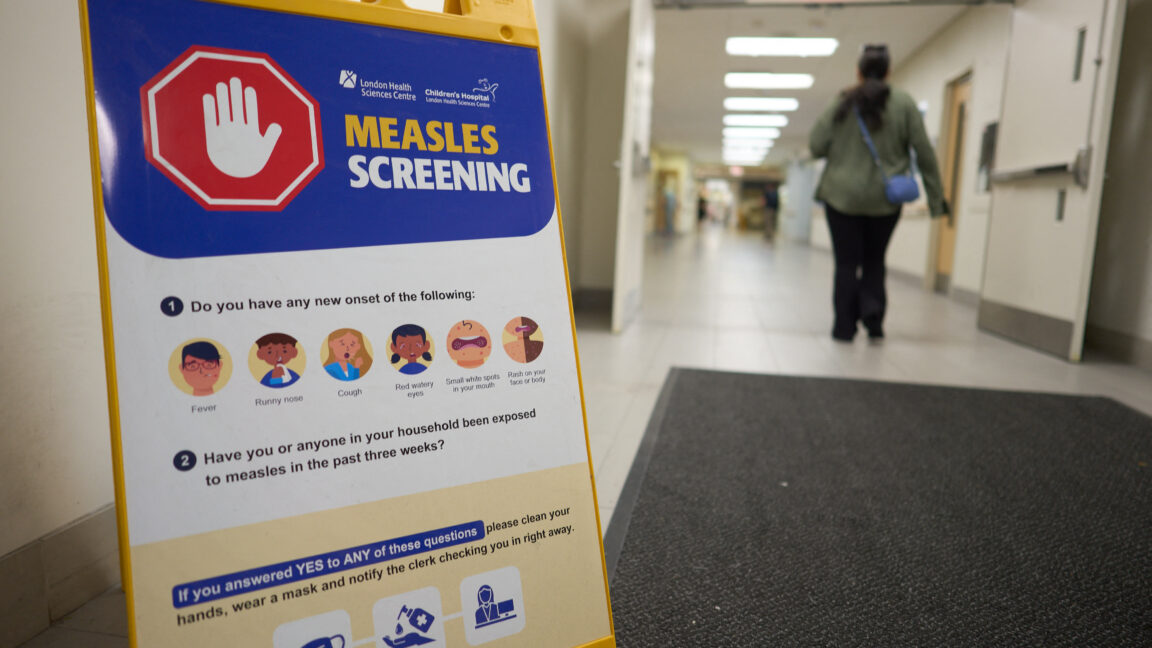Copyright Ars Technica

Canada has lost its measles elimination status, meaning the highly infectious virus is considered endemic once again in the country, The Pan American Health Organization (PAHO) announced Monday. The determination was made by a committee of PAHO experts, who spent last week poring over disease data to assess the measles status of countries across the entire region. The fact that Canada has lost its elimination status means that the region of the Americas overall has also lost the status, which it achieved in 2016. Of the 35 countries and territories in the region—a health region designated by the World Health Organization—Canada is currently the only country where measles is considered to be spreading endemically, though other countries, namely the US and Mexico, are headed in the same direction. Measles is considered eliminated when a country can go 12 months without continuous local spread. Sporadic cases brought in from international travel can continue to occur, potentially causing limited outbreaks. But elimination is lost and endemicity is declared only when transmission is sustained over the course of a year. Canada achieved elimination in 1998. The US did the same in 2000. Elimination was achieved through hard-fought vaccination campaigns, as two doses of the measles, mumps, and rubella (MMR) vaccine is 97 percent protective against the virus, and that protection is considered lifelong. But, since that time, vaccine misinformation and potent rhetoric from anti-vaccine activists—including current US Health Secretary Robert F. Kennedy Jr.—have taken hold, driving vaccination rates down on a population level. While the vast majority of American and Canadian parents continue to vaccinate their children, certain pockets and close-knit communities have become dramatically undervaccinated, providing potential footholds for the virus. That is the case in Canada, where a massive outbreak began in October 2024. It started in Canada’s province of New Brunswick, and cases linked to the outbreak have since been detected across the country. As of November 1, the Government of Canada has tallied 5,162 measles cases since the start of the year. In the PAHO meeting last week, experts evaluated genetic data from the cases and determined that the same strain that sparked the outbreak last October has continued to spread, surpassing the 12-month threshold. Although transmission has slowed, the virus is still spreading. There were 23 cases identified in the week of October 26 to November 1. “This loss represents a setback, of course, but it is also reversible,” Jarbas Barbosa, director of PAHO, said in a press briefing Monday. Call to action Barbosa was optimistic that Canada could regain its elimination status. He highlighted that such setbacks have happened before. “In 2018 and 2019, Venezuela and Brazil temporarily lost their elimination status following large outbreaks,” Barbosa noted. “Thanks to coordinated action by governments, civil society, and regional cooperation, those outbreaks were contained, and the Region of the Americas regained its measles-free status in 2024.” On Monday, the Public Health Agency of Canada released a statement confirming that it received notification from PAHO that it had lost its measles elimination status, while reporting that it is already getting to work on earning it back. “PHAC is collaborating with the PAHO and working with federal, provincial, territorial, and community partners to implement coordinated actions—focused on improving vaccination coverage, strengthening data sharing, enabling better overall surveillance efforts, and providing evidence-based guidance,” the agency said. However, Canada isn’t the only country facing an uphill battle against measles—the most infectious virus known to humankind. Outbreaks and sustained spread are also active in the US and Mexico. To date, the US has documented at least 1,618 measles cases since the start of the year, while Mexico has tallied at least 5,185. Bolivia, Brazil, Paraguay, and Belize also have ongoing outbreaks, PAHO reported. As of November 7, PAHO has collected reports of 12,593 confirmed measles cases from 10 countries, but approximately 95 percent of them are in Canada, Mexico, and the US. That total is a 30-fold increase compared to 2024, PAHO notes, and the rise has led to at least 28 deaths: 23 in Mexico, three in the United States, and two in Canada. The PAHO used Canada’s loss as a call to action not just in the northern country, but the rest of the region. “Every case we prevent, every outbreak we stop saves lives, protects families, and makes communities healthier,” Barbosa said. “Today, rather than lamenting the loss of a regional status, we call on all countries to redouble their efforts to strengthen vaccination rates, surveillance, and timely response to suspected cases—reaching every corner of the Americas. As a Region, we have eliminated measles twice. We can do it a third time.”



